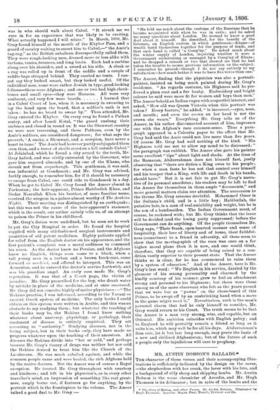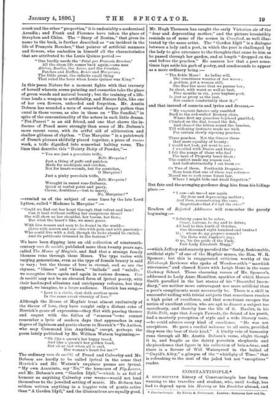MR. AUSTIN DOBSON'S BALLADS.* THE character of these verses and
their accompanying illus- trations is sufficiently indicated by the design on the cover, —the shepherdess with her crook, the lover with his lute, and a background of silly sheep and skipping lambs. Mr. Austin Dobson is the verse chronicler of Arcadia, and Mr. Hugh Thomson is its delineator ; but in spite of the lambs and the
• The Story of Regina, and other Verses. By Austin Dobson, DinstratAd Hugh Thomson. London Kegan Paul. Trench, Trebner and Co.
crook and the other "properties," it is undeniably a modernised Arcadia ; and Frank and Florence have taken the place of Strephon and Chloe. The "Story of Rosins," that gives its name to the book, is further described as "an incident in the life of Francois Boucher," that painter of artificial manners and flowers, who embodies in himself all the characteristics that are attributed to the Louis Qainze period :—
" One hardly needs the 'Feint par Francois Boucher.'
All the sham life comes back again,—one sees AlcOves, Ruelles, the Lever, and the Coucher, Patches and Ruffles, Roues and Marquises; The little great, the infinite small thing That ruled the hour when Louis Quinze was King."
In this poem Nature for a moment fights with that travesty of herself wherein scene-painting and cosmetics take the place of green woods and natural beauty ; but the training of a life- time lends a weapon to artificiality, and Nature falls, like one of her own flowers, unheeded and forgotten. Mr. Austin Dobson has sounded a note of somewhat deeper pathos than usual in these verses, as also in those on "The Sundial," in spite of the conventionality of the actors in each little drama. " Pot-Pourri " is an old friend, and one that shows the in- fluence of Praed more strongly than some of Mr. Dobson's snore recent verse, with its artful aid of alliteration and shallow glibness of rhythm. "line Marquise "is a patchwork of French phrases skilfully pieced together, a piece of rococo work, a trifle dignified into somewhat halting verse. The lines that describe this "Dainty Deity of Powder,"—
" You are just a porcelain trifle,
Belle Marquise !
Just a thing of puffs and patches, Made for madrigals and catches, Not for heart-wounds, but for scratches, 0 Marquise !
Just a pinky porcelain trifle, Belle Marquise !
Wrought in rarest rose-Dubarry, Quick at verbal point and parry, Clever, doubtless ;—but to marry, No, Marquise !"
—remind us of the subject of some lines by the late Lord Lytton, called "Madame la Marquise"
"Could we find out her heart through that velvet and lace ! Can it beat without raffling her sumptuous dress ? She will show us her shoulder, her bosom, her face ; But what the heart's like, we must guess.
With live women and men to be found in the world—
(Live with sorrow and sin—live with pain and with passion)— Who could live with a doll, though its locks should be curled, And its petticoats trimmed in the fashion ? "
We have been dipping into an old collection of nineteenth- century revs de societe, published more than twenty years ago, called The Muses of Mayfair, and find that a strange family likeness runs through these Muses. The type varies with varying generations, even as the type of female beauty is said to vary ; but the theme of love is eternal, and so are the rhymes, " Misses " and "kisses," " ballads " and " salads ; " we recognise them again and again in various dresses. Vers de socielg may not be an elevated form of lyrical poetry, with their hackneyed allusions and catchpenny refrains, but they appeal, we imagine, to a large audience. Herrick has sang,—
" Love is a circle, that doth restless move In the same sweet eternity of love."
Although the Muses of Mayfair treat almost exclusively of the theme of love, they have caught only a distant echo of Herrick's grace of expression—they flirt with passing themes and coquet with the follies of "seasons "—we cannot remember a lyric of modern days that approaches in any degree of lightness and poetic charm to Herrick's " To Anthea, who may Command him Anything," except, perhaps, the poem lately published by Mr. William Watson beginning,—
" Oh like a queen's her happy tread,
And like a queen's her golden head, But oh at last when all is said, Her woman's heart for me !"
The ordinary vers de societe of Praed and Calverley and Mr.
Dobson are hardly to be called lyrical in the sense that Herrick's and Mr. Watson's exquisite poems are lyrical. "My own Araminta, say No," the humours of Fly-Leaves, and Mr. Dobson's own "Garden Idyll,"—which is as full of humour as anything Calverley ever wrote—would not lend themselves to the jewelled setting of music. Mr. Dobson has seldom written anything in a happier vein of gentle satire than "A Garden Idyll," and the illustrations are equally good. Mr. Hugh Thomson has caught the early Victorian air of the "dear and deprecating mother," and the picture irresistibly reminds us of some of the scenes in Cranford, so well illus- trated by the same artist. The "Garden Idyll" is a dialogue between a lady and a poet, in which the poet is challenged by the lady to give utterance to the thoughts that came to him as he passed through her garden, and at length "dropped on the seat before the peaches." He assures her that a poet some- times lays aside his garb of poetry, and condescends to appear as a mere ordinary being
"The fickle Muse! As ladies will,
She sometimes wearies of her wooer ; A goddess, yet a woman still, She flies the more that we pursue her ; In short, with worst as well as best, Five months in six, your hapless poet, Is just as prosy as the rest, But cannot comfortably show it ;"
and that instead of sonnets and lyrics and dreams,— " My vagrant fancies only rambled
Back to the red-walled Rectory close, Where first my graceless boyhood gambled, Climbed on the dial, teased the fish, And chased the kitten round the beeches, Till widening instincts made me wish For certain slowly ripening peaches.
Three peaches. Not the Graces three Had more equality of beauty; I would not look, yet went to see ; I wrestled with Desire and Duty ; I felt the pangs of those who feel The laws of Property beset them ; The conflict made my reason reel, And half-abstractedly I eat them ;-
Or Two of them. Forthwith Despair— More keen that one of these was rotten— Moved me to seek some forest lair,
Where I might hide and dwell forgotten."
But fate and the avenging gardener drag him from his hiding.
place :— "I saw—ah me—I saw again
My dear and deprecating mother ;
And then, remembering the cane, Regretted—that I'd left the other."
Readers of Rejected Addresses will remember the parody beginning :—
" Sobriety cease to be sober,
Cease, Labour, to dig and to delve; All hail to this tenth of October, One thousand eight hundred and twelve I Ha! whom do my peepers remark ?
'Tis Hebe with Jupiter's jug; 0 no, 'tis the pride of the Park, Fair Lady Elizabeth Mugg,"
—which Jeffrey said scarcely parodied the "flashy, fashionable, artificial style" of one of the Mayfair muses, the Hon. W. R. Spencer ; but this is exaggerated criticism worthy of the Edinburgh Reviewer who spoke of Wordsworth's "mawkish utterances," and classed Keats with Leigh Hunt in the same Cockney School. Those charming verses of Mr. Spencer's, addressed to Lady Anne Hamilton, sparkles of which Horace Smith parodied in the last stanza of his "Beautiful Incen- diary," are neither more extravagant nor more artificial than a poet's compliments must necessarily be. There is a skill in successful trifling with trivial subjects that sometimes reaches a high point of excellence, and that sometimes escapes the notice of excellent critics, who are apt to dissect a subject too mercilessly, and thereby lose the life of it. Hazlitt, in his Table-Talk, says that Joseph Fawcett, the friend of his youth, had a masterly perception of style and a wide literary taste, —he could admire every kind of excellence. "He was not exceptions. He gave a cordial welcome to all sorts, provided they were the best of their kind." A kindly vein of humanity runs through all Mr. Austin Dobson's verse, slight though it is, and fragile as the dainty porcelain shepherds and shepherdesses that figure in his collection of bric-a-brac, and there is a flavour of Will Waterproof in the ballad of "Cupid's Alley," a glimpse of the "whirligig of Time," that is refreshing to the soul of the jaded but not "exceptions" reader.















































 Previous page
Previous page